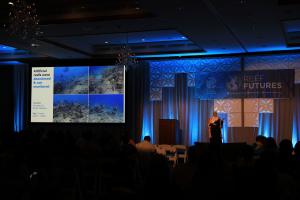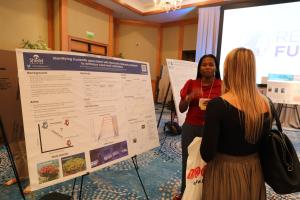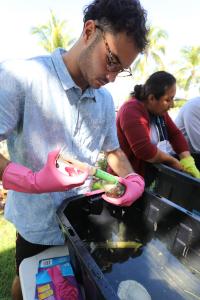
Scientists Meet During Hurricane Ian in a Race Against Time to Scale-Up Reef Restoration Efforts Around the World

Dr Tries Blandine Razak highlighting issues facing reef restoration efforts in Indonesia_Credit @ Coral Restoration Consortium
Scientists have just wrapped up a ground-breaking event aimed at scaling up efforts to restore our world’s most threatened ecosystems.
Nobody missed the irony of trying to hold a conference on coral reef restoration during one of the strongest storms to ever strike the Florida peninsula. While healthy reef systems benefit from storm energy, which clears substrates, fragments corals, and promotes ecosystem diversity, storms of Ian’s magnitude cause catastrophic damage to degraded coral reefs, damage that these impoverished ecosystems can no longer recover from naturally. This time, as South Florida moved out of Ian’s cone of uncertainty, Florida’s Coral Reef was very lucky, and, incredibly, Reef Futures 2022 also survived intact.
Hurricane Ian’s outer bands brought heavy rain, strong winds, and flooding to Key Largo; it was going to prove impossible to safely bring off-site participants to the symposium venue during the storm. But many had traveled to Reef Futures from the other side of the planet, aware that this kind of collaboration is vital if we are going to safeguard life on Earth. Determined to make it possible for these specialists to work together to try to ensure that we still have coral reefs by the end of the century, the Reef Futures planning committee was forced to completely reorganize the event. The committee, headed by the Coral Restoration Consortium co-chairs R. Scott Winters, CEO of Coral Restoration Foundation™, and Tom Moore, Director of the Reefscape Restoration Initiative at KAUST were already set up to live-stream the plenary sessions. And, against all odds, they managed to both ensure the safety of every participant and save every single session in the mammoth program.
This was the second in-person iteration of this unique scientific conference, and the field has changed dramatically since the first Reef Futures in 2018. Most notably it is becoming clear that restoration efforts are now being funded at ever-larger scales. “In 2018 we first brought together the brightest minds in reef restoration to try and solve the tangible but hard problems our field faced before it was too late,” says Moore, “This year we learned that call to action did not fall on deaf ears – global investment in coral reefs is really hitting its stride. Since Reef Futures 2018, this community has launched a series of massive projects, some of which were conceived at that first symposium. And even more importantly many more small ones were able to quickly find their ground in part because of what the CRC community has built.”
Other highlights of the symposium included Dr. Nikki Traylor-Knowles of the University of Miami's Rosenstiel School of Marine & Atmospheric Science and founder of Black Women In Ecology, Evolution, and Marine Science (BWEEMS) presenting her critical research on coral immunity - essential work as our reefs are currently being hammered by disease and bleaching - and Dr. Tries Blandine Razak alerting the community to the damage being done by well-intentioned but ill-informed restoration projects in Indonesia. KAUST shared their plans for one of the world’s largest coral restoration projects in the northern Red Sea and Alex Neufeld of CRF™ officially presented CeruleanAI, the world’s first open-access AI solution for large-scale coral reef monitoring - a game-changing product that will contribute to democratizing the field, accelerating the work, and slashing the costs involved in successful reef restoration efforts. But this process of inclusion must go much further.
R.Scott Winters explains, “Restoring the world’s tropical reefs is about people and the ecosystems they depend upon – not merely corals. You cannot do ‘conservation’ independent of the socio-economic fabric. Coral reef restoration must be about creating equity and opportunity for those communities that depend on coral reefs, incorporating long-standing indigenous knowledge into a bi-directional knowledge base, and reframing success to ensure we’re positively impacting lives through our actions to conserve and protect natural resources. I am very proud that Reef Futures stands as a unique example of international collaboration working to aspire to these goals.”
Reef Futures 2022 was convened by Coral Restoration Consortium (CRC), hosted locally by Coral Restoration Foundation™, NOAA, and supported by presenting sponsors King Abdullah University of Science and Technology (KAUST) and the United Way of Collier and the Keys with the United Arab Emirates. Thanks to these generous donors, international contributions to Reef Futures 2022 were facilitated by scholarships awarded to students, practitioners, and researchers from over a dozen developing nations. These important participants traveled to Florida from places including Kenya, Indonesia, and the Caribbean.
Alice T Grainger
Coral Restoration Foundation
+1 3054537030
email us here
Visit us on social media:
Facebook
Twitter
LinkedIn
Distribution channels: Education, Environment, Natural Disasters, Science, World & Regional
Legal Disclaimer:
EIN Presswire provides this news content "as is" without warranty of any kind. We do not accept any responsibility or liability for the accuracy, content, images, videos, licenses, completeness, legality, or reliability of the information contained in this article. If you have any complaints or copyright issues related to this article, kindly contact the author above.
Submit your press release

